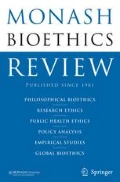Abstract
In order to continue to maintain public trust and confidence in human research, participants must be treated with respect. Researchers and Human Research Ethics Committee members need to be aware that modern considerations of this value include: the need for a valid consenting process, the protection of participants who have their capacity for consent compromised; the promotion of dignity for participants; and the effects that human research may have on cultures and communities. This paper explains the prominence of respect as a value when considering the ethics of human research and provides practical advice for both researchers and Human Research Ethics Committee members in developing respectful research practices.
Similar content being viewed by others
Notes
Although, as we later show, within this context, respect is a broader concept.
Convention for the Protection of Human Rights and Dignity of the Human Being with regard to the Application of Biology and Medicine: Convention on Human Rights and Biomedicine; Guidelines for the Conduct of Research Involving Human Subjects at the National Institutes of Health; European Convention on Human Rights; UNESCO Universal Declaration on Bioethics and Human Rights (UNESCO 2006), and others.
For example: the World Health Organisation: Council for International Organizations of Medical Sciences—International Ethical Guidelines for Biomedical Research Involving Human Subjects (CIOMS 2002); the Universal Declaration on Bioethics and Human Rights (UNESCO 2006) and the Convention for the Protection of Human Rights and Dignity of the Human Being with Regard to the Application of Biology and Medicine: Convention on Human Rights and Biomedicine (Council of Europe).
Guardianship Act 1987 (NSW) ss 3D, 33A
Guardianship and Administration Act 1986 (Vic) s37.
There is no reason why this ought to be limited to overseas research. Considerations of on-going impacts that research may have on the future welfare of participants after the completion of the study ought to be a consideration for all research.
References
Belmont Report. 1979. Ethical principles and guidelines for the protection of human subjects of research. The National Commission for the Protection of Human Subjects of Biomedical and Behavioral Research.
Council for International Organizations of Medical Sciences (CIOMS). 2002. International ethical guidelines for biomedical research involving human subjects. Geneva: World Health Organisation.
Emanuel, Ezekiel J. 2004. Ending concerns about undue inducement. Journal of Law Medicine and Ethics 32: 100–105.
Emanuel, Ezekiel J. 2005. Undue Inducement: Nonsense on Stilts? The American Journal of Bioethics 5(5): 9–13.
Helsinki. 1964. World Medical Association Declaration of Helsinki: Ethical Principles for Medical Research Involving Human Subjects, adopted by the 18th WMA General Assembly, Helsinki, Finland, October 2013.
Hudson, James M., and Amy Bruckman. 2004. “Go Away”: Participant objections to being studied and the ethics of chatroom research. The Information Society 20: 127–139. doi:10.1080/01972240490423030.
Kerridge, Ian, Michael Lowe, and Cameron Stewart. 2013. Ethics and law for the health professions, 4th ed. Leichardt NSW: The Federation Press.
Jonas, H. 1969. Philosophical reflections on experimenting with human subjects. Daedalus 98(2): 29–246.
Kant, Immanuel. 1785. Fundamental Principles of the Metaphysic of Morals (trans: Abbott, Thomas Kingsmill). Slough: Dodo Press.
Lange, M. M., W. Rogers, and S. Dodds. 2013. Vulnerability in research ethics: A way forward. Bioethics ISSN 0269-9702 (print); 1467-8519 (online) doi:10.1111/bioe.12032 Volume 27 Number 6: pp 333–340.
Macklin, Ruth. 2003. Dignity is a useless concept: It means no more than respect for persons or their autonomy. British Medical Journal 327: 1419–1420.
Milgram, S. 1963. Behavioural study of obedience. Journal of Abnormal and Social Psychology 67(940): 371–378.
National Health & Medical Research Council (NHMRC). 2003. Values and Ethics: Ethical Guidelines for the Ethical Conduct in Aboriginal and Torres Strait Islander Health Research. Australian Government National Health and Medical Research Council.
National Health & Medical Research Council (NHMRC). 2005. Keeping Research on Track: A guide for Aboriginal and Torres Strait Islander Peoples about Health Research Ethics. Australian Government National Health and Medical Research Council.
National Health & Medical Research Council (NHMRC). 2007. National Statement on Ethical Conduct in Human Research. Australian Government National Health and Medical Research Council & Australian Vice-Chancellor’s Committee.
National Health & Medical Research Council (NHMRC). 2009. Using the national statement 1: Payments to participants in research, particularly clinical trials.
Nuremberg Code: Trials of War Criminals before the Nuremberg Military Tribunals under Control Council Law No. 10, Vol. 2, pp. 181–182. Washington, D.C.: U.S. Government Printing Office, 1949.
Perry, G. (2013). Behind the Shock Machine. Scribe. ISBN (13): 9781921844553.
Spriggs, Merle. 2009. Consent in cyberspace: Internet-based research involving young people. Monash Bioethics Review 28(4): 32.
Spriggs, Merle. 2010. Understanding consent in research involving children: The ethical issues A handbook for Human Research Ethics Committees and Researchers. Children’s Bioethics Centre, Murdoch Childrens Research Institute, version 4, 2010.
Swiss Academy of Medical Sciences (SAMS). 2006. Palliative Care: Medical-Ethical Guidelines and Recommendations, 23 May 2006.
United Nations Educational, Scientific and Cultural Organisation. 2006. Universal Declaration on Bioethics and Human Rights.
Wilkinson, Martin, and Andrew Moore. 1997. Inducement in research. Bioethics 11(5): 373–389.
Author information
Authors and Affiliations
Corresponding author
Rights and permissions
About this article
Cite this article
Pieper, I.J., Thomson, C.J.H. The value of respect in human research ethics: a conceptual analysis and a practical guide. Monash Bioeth. Rev. 32, 232–253 (2014). https://doi.org/10.1007/s40592-014-0016-5
Published:
Issue Date:
DOI: https://doi.org/10.1007/s40592-014-0016-5



